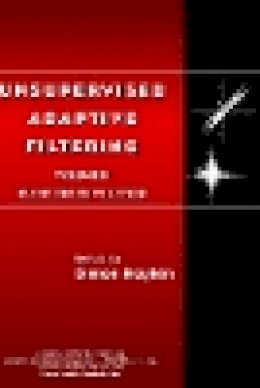
Stock image for illustration purposes only - book cover, edition or condition may vary.
Unsupervised Adaptive Filtering
Simon Haykin
€ 177.84
FREE Delivery in Ireland
Description for Unsupervised Adaptive Filtering
Hardcover. A complete, one-stop reference on the state of the art of unsupervised adaptive filtering While unsupervised adaptive filtering has its roots in the 1960s, more recent advances in signal processing, information theory, imaging, and remote sensing have made this a hot area for research in several diverse fields. Series: Adaptive and Learning Systems for Signal Processing, Communications and Control Series. Num Pages: 200 pages, Ill. BIC Classification: TJF; TJK. Category: (P) Professional & Vocational; (UP) Postgraduate, Research & Scholarly; (UU) Undergraduate. Dimension: 243 x 167 x 18. Weight in Grams: 454.
A complete, one-stop reference on the state of the art of unsupervised adaptive filtering
While unsupervised adaptive filtering has its roots in the 1960s, more recent advances in signal processing, information theory, imaging, and remote sensing have made this a hot area for research in several diverse fields. This book brings together cutting-edge information previously available only in disparate papers and articles, presenting a thorough and integrated treatment of the two major classes of algorithms used in the field, namely, blind signal separation and blind channel equalization algorithms.
Divided into two volumes for ease of presentation, this important work shows how these algorithms, although developed independently, are closely related foundations of unsupervised adaptive filtering. Through contributions by the foremost experts on the subject, the book provides an up-to-date account of research findings, explains the underlying theory, and discusses potential applications in diverse fields. More than 100 illustrations as well as case studies, appendices, and references further enhance this excellent resource. Following coverage begun in Volume I: Blind Source Separation, this volume discusses:
* The core of FSE-CMA behavior theory
* Relationships between blind deconvolution and blind source separation
* Blind separation of independent sources based on multiuser kurtosis optimization criteria
While unsupervised adaptive filtering has its roots in the 1960s, more recent advances in signal processing, information theory, imaging, and remote sensing have made this a hot area for research in several diverse fields. This book brings together cutting-edge information previously available only in disparate papers and articles, presenting a thorough and integrated treatment of the two major classes of algorithms used in the field, namely, blind signal separation and blind channel equalization algorithms.
Divided into two volumes for ease of presentation, this important work shows how these algorithms, although developed independently, are closely related foundations of unsupervised adaptive filtering. Through contributions by the foremost experts on the subject, the book provides an up-to-date account of research findings, explains the underlying theory, and discusses potential applications in diverse fields. More than 100 illustrations as well as case studies, appendices, and references further enhance this excellent resource. Following coverage begun in Volume I: Blind Source Separation, this volume discusses:
* The core of FSE-CMA behavior theory
* Relationships between blind deconvolution and blind source separation
* Blind separation of independent sources based on multiuser kurtosis optimization criteria
Product Details
Format
Hardback
Publication date
2000
Publisher
John Wiley and Sons Ltd United States
Number of pages
200
Condition
New
Series
Adaptive and Learning Systems for Signal Processing, Communications and Control Series
Number of Pages
200
Place of Publication
, United States
ISBN
9780471379416
SKU
V9780471379416
Shipping Time
Usually ships in 7 to 11 working days
Ref
99-50
About Simon Haykin
SIMON HAYKIN, PhD, is University Professor and Director of the Adaptive Systems Laboratory at McMaster University.
Reviews for Unsupervised Adaptive Filtering
